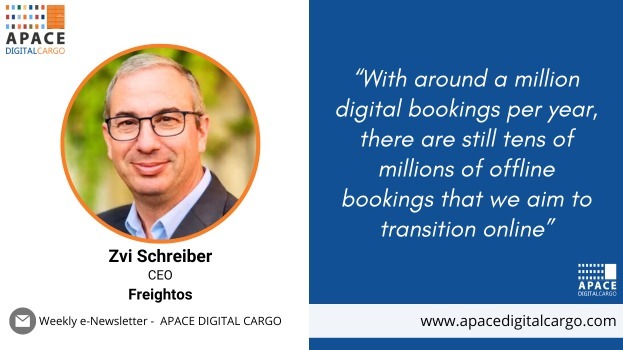
WebCargo by Freightos comprises a vast network of numerous freight forwarders and multiple airline carriers, with a focus on tapping the Indian air cargo market. According to Zvi Schreiber, CEO of Freightos, “The air cargo sector in India is witnessing notable expansion, as more freight forwarders and airlines adopt digital integration.” With a million digital bookings in the previous year, Freightos aims to transition the entire air cargo industry to online platforms.
How do you perceive the Indian freight forwarding market, and what does Freightos provide for the Indian air logistics sector?
We are thrilled about our visit to India, a significant market for Freightos. In Chennai, India, we have established our Asia headquarters, and Freightos provides the largest digital booking platform for air cargo known as WebCargo by Freightos. Over the past five years, we have eagerly awaited the digital revolution. Previously, there was no digital booking available in air cargo, but with WebCargo, we have successfully connected with numerous airlines and freight forwarders digitally.
Currently, we collaborate with over 50 airlines worldwide and approximately 4000 forwarders. The air cargo industry in India is experiencing significant growth, although it has been slower in adopting digitalization compared to Europe. However, India is making remarkable progress in this area, with an increasing number of freight forwarders and airlines embracing digital connectivity.
It’s inspiring to witness the industry’s advancement, especially considering that online booking platforms for airline tickets have been present in the passenger sector for over 25 years. While the passenger side has been digital for more than two decades, the air cargo sector has been slower to transition. Nonetheless, progress is evident, with nearly a million electronic bookings conducted globally last year through WebCargo. The industry is progressively integrating digital strategies, including in India.
What opportunities do you envision in the Indian market with the advancements in infrastructure and technology? As more freight forwarders embrace technology, how does Freightos contribute to this evolving landscape?
We are privileged to be the top digital booking platform for freight services. When a freight forwarder needs to book air cargo, they have two options:
- The traditional method involves contacting the airline by phone or email, which can take several hours or even a day or two, resulting in delays.
- The second option is WebCargo by Freightos, where the basic booking service is free, making it easily accessible to freight forwarders. With WebCargo, freight forwarders can check available rates and capacity within 60 seconds and book digitally.
Our main goal is not only to assist freight forwarders but also to enhance import and export services, promoting trade with instant transparent data and efficient bookings.
In the competitive market, especially in the technology-driven industry, what is Freightos’ strategy, both in India and globally? Could you share your expansion plans with us?
The air cargo industry is predominantly offline, but we are leading the way in revolutionising it. With around a million digital bookings per year, there are still tens of millions of bookings done offline in the air cargo industry. Our goal is to transition all of them online.
As a platform, we focus on providing connectivity and data rather than handling cargo directly. In addition to bookings, we offer the FAX (Freightos Air Index), which equips over 10,000 supply chain professionals with the necessary air freight data for research, monitoring, and analysis of air freight and cargo pricing trends. The FAX provides real-time updates on industry prices every day, offering valuable insights into the current market trends.
Have you encountered any challenges with your industry offerings, or how does the industry respond to them?
As previously mentioned, the industry remains traditional and heavily reliant on paper, presenting a significant challenge. However, once introduced to digital solutions, individuals seldom revert to the old ways. For instance, when freight forwarders switch to WebCargo, they experience immediate access to information and find it difficult to return to their previous methods. This is what happens in our personal life as well; once we shop on Amazon or engage in online banking, we rarely look back. The key is to patiently encourage people to embrace new technologies.
What do you anticipate for the future of services such as WebCargo in the next five years?
We anticipate a rise in volumes in the future. Although many bookings are currently made offline, there is potential for digital volume growth. In addition to air cargo, we are also involved in ocean freight, and we recognize modernising payments as an important area for us.





